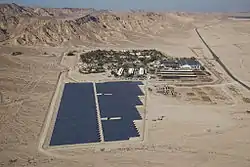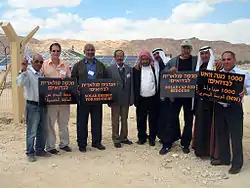Arava Power Company
Arava Power Company (APC) is a solar energy company founded in 2006 on Ketura in the Arava Valley. On June 5, 2011, APC inaugurated Israel's first medium-sized solar field, Ketura Sun. The field stretches over 80 dunams (8 hectares or 20 acres) of land and has an installed power of 4.95MW.[1] As Arava Power is an environmentally conscious company, it installs solar fields only on land zoned solely for agricultural or industrial use.
 | |
| Industry | Solar fields |
|---|---|
| Founded | 2006 |
| Founder | David Rosenblatt, Ketura through Ed Hofland, Yosef Abramowitz (active until 2010) |
| Headquarters | Arava, Negev, Ketura , Israel |
| Website | www |
In the Ketura Sun project, photovoltaic (PV) solar panel from Suntech company were used, in collaboration with Siemens Israel. Arava's mission is to supply Israel with 10% of its energy needs through clean, renewable solar energy.
History
Arava Power Company cites Israel's first Prime Minister, David Ben Gurion, as an inspiring figure for the vision of the company. In 1956, Ben Gurion said: "The largest and most impressive source of energy in our world and the source of life for every plant and animal, yet a source so little used by mankind today is the sun... Solar energy will continue to flow toward us almost indefinitely."
In August 2008, Siemens Project Ventures invested $15 Million in the Arava Power Company. In a press release published that month, Peter Löscher, President and CEO of Siemens AG said: “This investment is another consequential step in further strengthening our green and sustainable technologies”. Siemens now holds a 40% stake in the company. [2]
On November 21, 2010, the Minister of National Infrastructure, Uzi Landau, signed a Power Purchase Agreement with Ketura Sun Company (owned by Arava Power Company) worth an estimated 250 Million NIS. The agreement is valid for twenty years and guarantees that the energy produced at Ketura Sun will be transferred to the Israel Electric Corporation's power lines. It is the first PPA in Israel with a solar energy company.[3]
In December 2010, Bank Hapoalim signed an agreement with Arava Power to extend a loan of 80 Million NIS to APC in order to fund the Ketura Sun project (valued at ~100 Million NIS).[4]
On June 5, 2011, APC inaugurated Israel's first solar field, Ketura Sun.[5]
On May 22, 2012 Arava Power announced that it had reached financial close on an additional 58.5 MW for 8 projects to be built in the Arava and the Negev valued at 780 Million NIS or approximately $204 Million.[6]
Ketura Sun

Ketura Sun is the first commercial medium size solar field in Israel, as well as the first solar field in the Middle East. The solar field is built on the premises of Ketura, an income-sharing community in the Arava Valley, in the south of Israel about 45 minutes north of Eilat. This location has some of the highest levels of solar radiation in the world and at the same time enables a direct connection to Israel's national grid.
The solar field covers an area of 80 dunams (8 hectares or 20 acres) with its 18,500 Suntech photovoltaic solar panels. The total production is 9 Million kilowatt hours per year with an installation power of 4.95 MW.
Partnership with Bedouins

The Arava Power Company has signed multiple agreements with Bedouin families in the Negev desert to build solar fields on approximately 92 acres of land, with a production capability of up to 20 megawatts. APC has been lobbying the Israeli government to create separate solar caps for Bedouins.[7]
On February 7, 2012, Arava Power announced that it had received a license for the Tarabin Solar Field, the first solar field for the Bedouin community. Financing for the $30 Million Tarabin installation is to be provided by OPIC – the Overseas Private Investment Corporation of the United States Government.
Aside from enabling the Bedouin community to benefit from governmental incentives that promote renewable energy in the Arava and Negev, solar fields provide livelihood and employment. The Israel Electric Corporation is obligated by law to buy privately produced electricity at a predictable and fixed cost. It is believed that construction of solar sites will develop the region's infrastructure.[8]
In January 2011, Musa Abu Karinat, an Israeli Bedouin who signed an agreement with Arava Power, told Haaretz “Our village has proper electricity infrastructure, so we don’t need the plant for electricity for the village. Our goal is to build a solar farm on private land owned by a particular family, and to sell the energy it will produce to the national energy grid.”[9]
Regulatory goals
Before 2006, Israel had very few government regulations and statutes regarding solar energy.[10] The company's regulatory goals include:
- Increasing the cap on medium size fields from 300 MW to 1,500 MW
- Ensuring the building of transmission lines from the south to the center of the country
- Rationalizing the policies of the Israel Lands Authority to promote solar power.
- Passing a renewable energy law by the Knesset with a 20% renewable goal by the year 2020, in line with the European Union.[11]
Social mission
Arava Power Company is committed to corporate social responsibility.[12] Within the Torah’s rules for Tzedakah (charitable giving) is the law of Pe'ah. Pe’ah requires that the four corners of any field be left untouched by harvesters and saved for the poor to glean.[13] Arava Power Company is giving Pe’ah a modern twist, dedicating the four corners of the Ketura Sun solar field to four different non-profit organizations that will benefit from the funds earned by each corner for the next 20 years.[14]
The four organizations are:
- Jewish Heart for Africa: An organization which uses Israeli solar systems to power African schools, medical clinics, orphanages and solar powered water pumping systems.[15]
- Bustan: “An NGO that works with the Bedouin of the Negev for fair resource allocation, including renewable energy, as well as social and environmental justice for all peoples in the region.”[16]
- Elie Wiesel Foundation for Humanity: “The Foundation's mission is to combat indifference, intolerance and injustice through international dialogue and youth-focused programs that promote acceptance, understanding and equality.”[17]
- Red Mountain Therapeutic Riding Center: Located South of Ketura Sun, the Riding Center at Grofit helps disabled children from the region who are in need of therapeutic riding.
Arava Power's commitment to the law of Pe’ah has been made permanent with the placement of a statue of Ruth created by former Ketura artist Gil Aruch, at the entrance to the field. The Biblical story of Ruth is one of tolerance, social-religious acceptance and justice. The Royal Tribe of Judah accepts Ruth the Moabite, the convert who comes from a foreign culture and enemy land.[18]
Solar creativity
Arava Power Company has done a variety of creative projects to raise social awareness for solar energy in Israel.
Rapper Shyne recently released a new song entitled “Solar Energy”. Shyne premiered the song on June 5, 2011, at the Ketura Sun launch.[19]
Arava Power partnered with Mayumana, an Israeli dance troupe, to create a promotional video for the Israel EcoCinema Festival. The video was used a second time as Arava Power Company's video-invitation to launch of Ketura Sun in 2011.[20]
See also
References
- "Arava Power Company". Archived from the original on July 7, 2011. Retrieved June 27, 2011.
- "Siemens invests $ 15 million in Israeli solar company Arava Power" (PDF) (Press release). Siemens AG. August 28, 2009. Retrieved June 27, 2011.
- Arava Power and Uzi Landau sign Power Purchase Agreement. Jerusalem, Israel: AravaPower. November 21, 2010.
- Waldoks, Ehud Zion (December 14, 2010). "Construction To Begin On Israel's First Solar Field". The Jerusalem Post. Israel. Retrieved June 26, 2011.
- "Arava Power Company". Archived from the original on July 7, 2011. Retrieved June 27, 2011.
- Roca, Marc (May 22, 2012), "Arava Closes Funding For $204 Million Israeli Solar Plants", Bloomberg, retrieved June 3, 2012
- Rinat, Zafrir (January 4, 2011), "Solar panels prove a money-spinner for Bedouin in the Negev", Haaretz, retrieved June 27, 2011
- Rinat, Zafrir (January 4, 2011), "Solar panels prove a money-spinner for Bedouin in the Negev", Haaretz, retrieved June 27, 2011
- Rinat, Zafrir (January 4, 2011), "Solar panels prove a money-spinner for Bedouin in the Negev", Haaretz, retrieved June 27, 2011
- "Arava Power Company Regulatory Success". Retrieved June 27, 2011.
- "Arava Power Company Regulatory Success". Retrieved June 27, 2011.
- Sharon Udasin. "Arava Power Investing Profits from New Solar Fields in Social Causes". Retrieved January 12, 2015.
- Jeffrey Spitzer. "Pe'ah". Retrieved June 26, 2011.
- "Ketura Sun Field Profile". Archived from the original on March 9, 2012. Retrieved June 26, 2011.
- "Jewish Heart For Africa". Archived from the original on July 13, 2011. Retrieved June 26, 2011.
- "Bustan". Archived from the original on August 15, 2011. Retrieved June 26, 2011.
- "The Elie Wiesel Foundation for Humanity". Archived from the original on June 19, 2011. Retrieved June 20, 2011.
- "Ketura Sun Jewish Values and Social Responsibility". Archived from the original on October 6, 2011. Retrieved June 23, 2011.
- Shyne sings 'Solar Energy' song. Ketura, Israel: Jerusalem Post Video. June 5, 2011.
- You Are Invited to the Inauguration of Israel's First Solar Field. May 16, 2011.